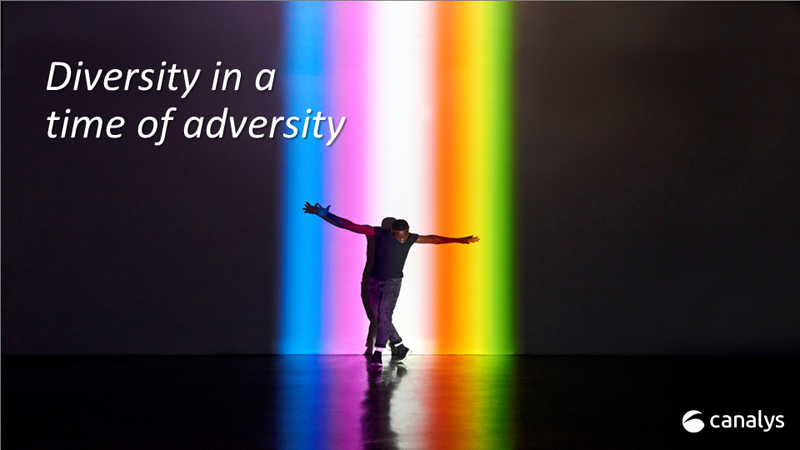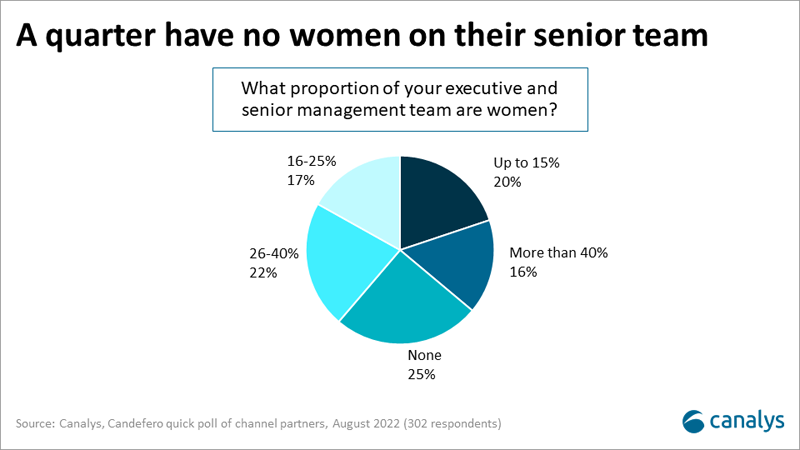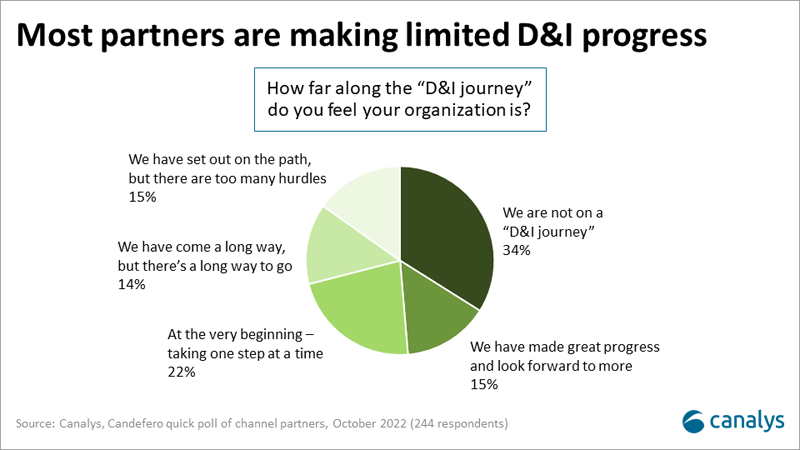Retailers deliver anytime, anywhere to tempt consumers
30 November 2022

A summary of the main talking points from our diversity, equity and inclusion panels with vendors and channel partners participants.
Canalys ran a series of “Expert Hubs” at its APAC and EMEA Canalys Forums 2022. The aim was to gather experts within the channel partner community to feature a mix of opinions from partners and vendors. In this series of Canalys Forums 2022 blogs, we summarize some of the key points.
Partner participants
APAC: NEXTGEN, Tech Data – a TD Synnex company, VLAN Asia, CDP (India) Private Ltd
EMEA: Dustin, Insight, SHI UK, Markit, TD SYNNEX
Vendor participants:
APAC: HP Inc, Lenovo
EMEA: Fujitsu, Lenovo, HPE Aruba
Key points
Research from a recent Candefero channel partner poll about gender representation in channel organizations yielded some positive results. Around 15% of respondents said that 40% of their management and executive teams were made up of women. Progress, maybe? But a quarter said that they have no women on their management or executive teams – just one example of the continuing imbalances in the IT industry.

On a more positive note, an inclusive environment is more in demand than ever, and more clients and incoming Gen Z talent are looking for organizational diversity. This is driving companies to ensure their work environments are more inclusive and toward establishing successful initiatives and programs that help erase biases. Biases most commonly exist in the tech industry around education, socioeconomic background, ethnicity, religion, sexuality, gender, physical and mental ability, and cultural heritage, but the discussion was not limited to these.
The panelists at the APAC and EMEA Canalys Forums 2022 discussed the best strategies and practices to help inspire partners, especially those that are smaller, to create diversity, equity and inclusion, focusing on gender inequality, but encompassing all aspects. Recent Canalys research shows that many channel partners feel they are making slow progress in terms of improving diversity and inclusion, with 34% of those polled saying they are not on a “D&I journey” at all.

Structure and intentionality in the hiring process are vital to limit biased decision-making
Many managers firmly believe in hiring the best fit. They often do not realize that their best choice is often prejudiced due to unconscious biases. A panelist remarked that, for example, greater male management leads to the tendency to hire more men. This opened the discussion onto actions that can help limit bias. One panelist suggested that certain candidate profiling information is anonymized during the hiring process, giving the applicants a greater chance of fair assessment.
Panelists debated the importance of having all-women shortlists. Some partners have implemented this, but it remains a highly contentious and divisive issue and is often dependent on the company policy and country legislation. A recommendation was made to mandate women sitting on recruitment panels to help bring a more inclusive perspective to the hiring process. This is an action that can be taken regardless of company size.
There was mix of responses in terms of the KPIs around DEI being tracked. A key starting point for organizations of any size is to start measuring – “collect, count and compare”.
Dedicated programs for training and mentorship are vital to tackle low representation
Many vendors and larger partners pointed to targeting education and training in their organizations. This included sponsored programs and skill academies that have been put in place to amplify minority groups’ skills, opportunities and confidence. Having employee resource groups is another effective way of helping people from diverse backgrounds to establish themselves and find common ground with other colleagues. These initiatives can be tough to roll out for SMBs, which do not have the resources themselves internally. There are many external agencies and resources that can be accessed, and some vendors and larger partners offer shared resources. Diversity and inclusion ambassadors were also noted to be significant as they can help in the promotion of education, awareness and normalization of DEI in an organization.
Diversity in education, background, ethnicity, religion, sexuality, gender, physical and mental ability, and cultural heritage, as well as gender, is vital to boost creativity
Creativity is how the tech industry gets more competitive. To acquire this edge, companies need to hire people from all walks of life and give them a place with a sense of belonging. To propel change, these employees must not only be recruited but need to be in positions of influence. Diversity among leadership team positions will serve as inspiration, following the adage “you can’t be who you can’t see”.
Conclusion
Across both panels there was consensus that diversity needs to be embraced at a leadership level to create change throughout an organization. If it is just a side program, it will be tough to implement at an organizational level. With recruitment being one of the biggest challenges any channel partner or vendor is facing, action is needed now to attract and retain talent and rectify imbalances and inequalities in the tech industry to better represent our customers.
Watch videos from the Canalys Forums 2022: